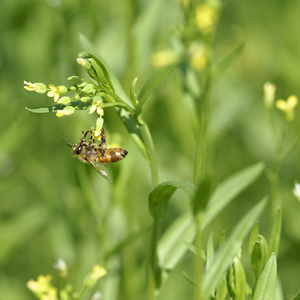USDA RMA strengthens the camelina crop insurance program for 2026 and succeeding crop years

SOURCE: USDA
July 9, 2025
BY USDA Risk Management Agency
The USDA’s Risk Management Agency is implementing multiple changes to the Camelina pilot insurance program for the 2026 and succeeding crop years. The changes will expand coverage options and provide greater flexibility for producers growing this emerging biofuel crop.
“RMA worked closely with stakeholders to develop these improvements,” said Alexa Talkington, deputy director of the RMA Regional Office in Billings. “These changes ensure our camelina insurance program better serves this growing industry while providing the coverage flexibility that producers need.”
Beginning with the 2026 crop year, the Camelina crop insurance program will be available nationwide through written agreements, coverage will be available for organic production and camelina grown under contracts based on a futures price have new protections.
Some processors have offered camelina contracts with the price based on soybean futures, allowing the contract price for camelina to follow the price of soybeans up or down. For camelina insurance, the contract price is also used to establish the insurance guarantee, which must be locked in by the acreage reporting date.
Advertisement
Advertisement
To ensure producers maintain maximum flexibility for pricing their camelina with their processor, RMA is establishing a one-week time period to average the futures specified in the processor agreement in order to set the insurance guarantee. This ensures there is a known camelina price for the insurance guarantee and continues to allow producers to lock in their soybean futures with their processor at a time of their choosing.
About the Program
Camelina is an oilseed crop primarily used for biofuel production. The program was originally required by the 2008 Farm Bill and first became available for the 2012 crop year.
The Camelina crop insurance policy offers Actual Production History coverage, which insures a producer’s historical yield. Coverage is available only for camelina grown under contract with a processor and the price in the contract is used to establish the insurance coverage.
Advertisement
Advertisement
Producers interested in planting and insuring camelina should contact their crop insurance agent to discuss program details, including upcoming sales closing dates for their area and the written agreement process.
More Information
RMA secures the future of agriculture by providing world class risk management tools to rural America through Federal crop insurance and risk management education programs. RMA provides policies for more than 130 crops and is constantly working to adjust and create new policies based on producer needs and feedback.
Contact a crop insurance agent to see how Federal Crop Insurance can meet the specific needs of your operation. Crop insurance is sold and delivered solely through private crop insurance agents. A list of crop insurance agents is available online at the RMA Agent Locator. Producers can learn more about crop insurance and the modern farm safety net at rma.usda.gov or by contacting their RMA Regional Office. RMA’s Basics for Beginners provides information for those new to crop insurance.
Related Stories
Phillips 66 on July 25 released Q2 financial results, reporting the company’s Rodeo Renewable Energy Complex in California continues to run at reduced rates due to market conditions. Pre-tax income for the renewables segment was up when compared to Q1.
The EIB and Eni on July 24 signed a €500 million 15-year finance contract to support the conversion of Eni’s Livorno refinery in Tuscany, Italy, into a biorefinery that can produce renewable diesel, renewable naphtha and bio-LPG.
Iowa Secretary of Agriculture Mike Naig announced that the Iowa Renewable Fuels Infrastructure Program Board recently approved an additional 24 applications from Iowa fuel retailers to support new and expanded biofuel infrastructure projects.
CountryMark on July 22 celebrated the completion of more than $100 million in upgrades at its refinery in Indiana, including those related to soybean oil storage. The facility produces renewable diesel via coprocessing technology.
ATOBA Energy and Air Moana are partnering to implement scalable solutions for the supply of SAF. The collaboration aims to ensure long-term SAF availability while supporting local initiatives to develop sustainable fuel production in Tahiti.
Upcoming Events










